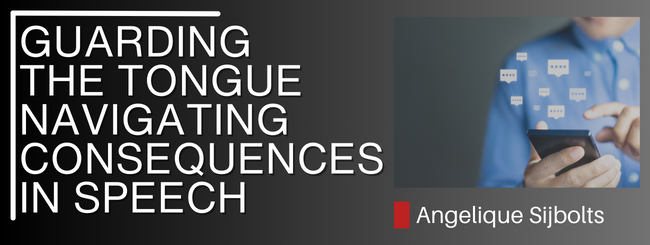בס”ד
Develop yourself to the best of your ability
Sometimes, we chatter away unconsciously, unaware of the impact our words may have on others. It often seems like talking is merely a form of social interaction, a way to connect without delving deeper into the significance of our words. However, in reality, we need to be mindful of what we say, as our words can have significant consequences.
This realization is exemplified through stories about Abraham, Jacob, and Joseph, where they experience the repercussions of their words. In Mesillat Yesherim[1] we read:
Avraham, who was so beloved to his Maker such that scripture testifies of him “Avraham, My beloved” (Isaiah 41:8). Even so, he did not escape from judgment for slight words which he was not meticulous in, namely, for merely saying “with what will I know?” (Gen. 15:8), G-d replied to him: “by your life, you will know that your descendants will be foreigners [in Egypt]” (Nedarim 32a).
Yaakov, for replying angrily to Rachel when she said to him “give me children”, the Midrash reports (Genesis Raba 71:10): “the Holy One blessed be He, said to him: ‘is this how one answers a distressed person? By your life, your sons will stand before her son’.
Yosef, for saying to the officer of [Pharaoh’s] drink: “But remember me when it is well with you [and please show kindness to me, and make mention of me to Pharaoh.]” (Gen 40:14), his sentence [in prison] was increased by 2 years as the Midrash reports (Genesis Raba 89b).
Initially, their questions, reactions, and requests seem reasonable and understandable.
For instance, why shouldn’t Abraham ask for a sign that his descendants would inherit the land, especially after years of waiting for a child?
In Jacob’s case, it’s understandable that he would react with irritation when Rachel remained childless. Yet, looking from a distance, it might have been wiser not to respond based on emotion but to be understanding and approach God together with Rachel.
As for Joseph, imprisoned and presented with an opportunity to escape, it seems logical for him to ask the officer to put in a good word with Pharaoh. While it’s easy to say he should have placed his trust in God and not the officer, we can empathize with his reaction given his circumstances.
The Talmud warns us about the power of the tongue, we read in Arakhin 15b:5
I (G-d) have surrounded you (the tongue) with two walls, one of bone, i.e., the teeth, and one of flesh, the lips. What shall be given to you and what more shall be done for you, to prevent you from speaking in a deceitful manner, tongue?
The examples of Abraham, Jacob, and Joseph serve as a reminder that, before speaking, we should consider the potential consequences and whether, from a distance, we might know better what should or should not be said. Mastering control over our speech is crucial in all aspects of life.
In our current times, it is crucial not only to guard our tongues but also our fingers. The rapidity with which messages can be written and sent in today’s digital age often leads to impulsive communication without careful consideration. Ironically, the act of writing could serve as a way to introduce a pause, allowing for reflection on what is being said before it’s sent. However, we frequently neglect to take the time for such contemplation, and messages are dispatched swiftly without adequate thought. Similar to verbal communication, the importance of reflection and mastery over our words extends to the written realm, emphasizing the need for thoughtful and deliberate expression in our fast-paced digital interactions.
Learning Points
Reflect Before You Speak, Following the Wisdom of the Talmud: The stories of Abraham, Jacob, and Joseph emphasize the critical lesson of pausing to reflect before expressing ourselves. Drawing from the Talmud’s wisdom about guarding the tongue, this highlights the importance of considering the potential consequences of our words and mastering control over our speech.
Trust in Divine Timing: Abraham’s desire for a sign, Jacob’s frustration, and Joseph’s plea for help all reflect human impatience and a lack of trust in divine timing. Learning to trust that things unfold in their own time can lead to more thoughtful and measured responses.
Mindful Digital Communication:In the era of instant messaging, it’s crucial to extend the practice of reflection to both our spoken and written words. Guarding not just our tongue but also our fingers becomes paramount. Taking a moment to reflect before sending messages can prevent hasty communication, contributing to more meaningful and considerate conversations.
By Angelique Sijbolts
Sources:
[1] Mesillat Yesharim, The Path of the Upright by Moses Hayyim Luzzatto
© Copyright, all rights reserved. If you enjoyed this article, we encourage you to distribute it further.
Our blogs may contain texts/ quotes or references of
Mechon-Mamre.org, Aish.com, Sefaria.org or AskNoah.org
that contain copyrights and which we may use with there permission.
